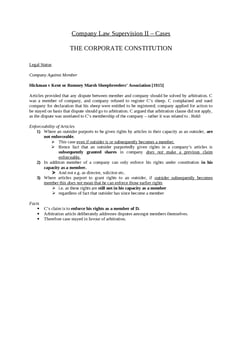Criterion Properties plc v Stratford UK Properties [2004] UKHL 28
Judgement for the case Criterion Properties plc v Stratford UK Properties
Table Of Contents
Two companies formed a partnership. Fearing that their company would be taken over, directors of first company (Claimant) signed ‘poison pill’ agreement with second company (Defendant) stating that in event of Claimant being taken over, Defendant would have right of favourable buy-out.
Takeover did not materialise, but Defendant refused to rescind agreement. Claimant applied to have agreement set aside, on grounds that its directors had acted improperly when entering agreement (as the agreement was to commercial disadvantage of Claimant) and that Defendant had known this was the case.
In Court of Appeal, was held that use of powers by Claimant’s directors was improper and that as Defendant had known this, it would be unconscionable for them to rely on agreement.
Held in HL
-
Issue is not one of unconscionability.
Rather when third party seeks to uphold contract, question is always whether the agent had authority or not
Whether it would be unconscionable for T to rely on contract is irrelevant
-
Where third party knows that contract is contrary to commercial interests of company, is almost never ostensible authority.
I.e. as here, T cannot claim with any credibility he thought director had actual authority.
On facts, unclear whether there was ostensible authority or not.
For Further Study on Criterion Properties plc v Stratford UK Properties
Need instant answers? Our AI exam tutor is here to help.
Ask questions 🙋 Get answers 📔 It's simple 👁️👄👁️
Our AI is educated by the highest scoring students across all subjects and schools. Join hundreds of your peers today.
Get StartedSimilar Cases
Related Product Samples
These product samples contain the same concepts we cover in this case.
| Company Law | Transactions With Outsiders Notes (24 pages) |

